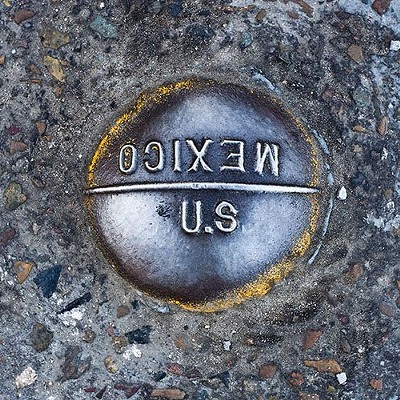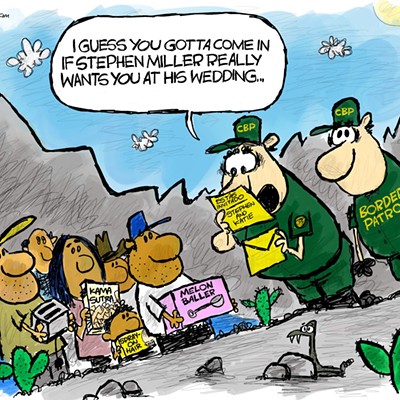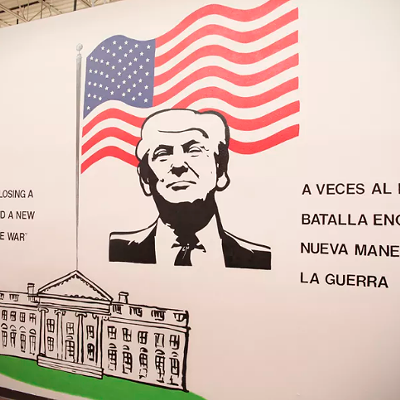Republicans in the Arizona Senate have given preliminary approval to SB 1083 to set up a special-missions unit of 300 volunteers to patrol the border. Your reaction?
WIRTH: It's political to get votes from people who aren't educated about the border.
GRAVES: Stupid. That's like trying to take care of the border, and the border is an 8-foot rattlesnake, and the way you take care of it is giving it mouth-to-mouth.
WIRTH: We're at record levels of law enforcement on the border now. I'm all for citizens being able to carry guns for self-defense, but having people out patrolling would be very dangerous.
GRAVES: That's why we got really upset with (Maricopa County) Sheriff (Joe) Arpaio, who wanted to bring down a bunch of civilians with weapons to do what Border Patrol couldn't. ... I said: If you're a deer hunter, and all you want to do is hunt deer in a canyon at night, these guys won't be able to tell the difference between you and a possible rip-off team.
Take the Peck Canyon Corridor, in the Atascosa and Tumacacori mountains north and west of Nogales. Bandits are assaulting, robbing and raping crossers in there regularly. We had three execution-style murders there in November. Is that public land safe for us to use?
GRAVES: In all my years on the border, the only time I was threatened was by two U.S. citizens who didn't want me to drive down a road. (Another) incident was when I was walking down a trail in a Forest Service uniform and ran into a guy who opened his jacket to show me a Mac-10 under his arm. He tapped his hand on it. I waved at him and showed him I didn't have a gun, and he waved back. And I went my way, and he went his.
What do you suppose he was doing?
GRAVES: Probably leading people. This was eight years ago down near Arivaca, in California Gulch. Last year, I was doing training for the (U.S. Department of Agriculture) on border security, and I said, "How many of you will get into camp, open your sleeping bag, go hiking for the day, come back, and get into your sleeping bag without checking it first?" That would be stupid. Going down to the border is the same thing: You need situational awareness. Don't challenge people you have no legal right or capability to challenge. If you're going camping and see a Border Patrol agent, ask how things are out there today. Sometimes they'll say, "Ah, not so good."
So it's like going to Las Vegas and rolling the dice?
GRAVES: No. Go back and look at records, and find a citizen who has been assaulted.
WIRTH: Oh, we have them.
GRAVES: Well, not many.
WIRTH: But it happens. Not a great deal, but the fact that it's occurring is troubling. That's why most of Organ Pipe Cactus National Monument is closed to the public. It's not safe for people to be wandering around the desert by themselves.
GRAVES: It happens because people get into a drug-smuggler's face.
WIRTH: There are carjackings because they want vehicles.
GRAVES: It's more dangerous for you to be driving down I-19 from Tucson into the Peck Canyon area than it is to hike there. In my years here, only once to my knowledge was someone recreating on the Coronado National Forest assaulted by individuals hijacking a car.
WIRTH: I'm aware of two carjackings of park visitors: one at the Coronado Memorial, and one at Organ Pipe. There were many vehicles stolen from the San Bernardino and Buenos Aires refuges. And there were several attempted carjackings at Organ Pipe that weren't successful.
Keith, I talk all the time to the folks living out in the mountains west of Nogales, and I can tell you they're worried.
GRAVES: They live out there, so people passing through can always impact them. Everybody living out in the country has concerns about property damage and being broken into. And those are legitimate concerns. But when you park your car and put up your tent, you're pretty much left alone. They don't care about you.
WIRTH: It's a wrong-place, wrong-time thing. If you know the place is wrong, the more time you spend in the wrong place, the higher the probability of having a wrong time.
Dan, would you go hiking in the Peck Canyon area?
WIRTH: No. I'd go somewhere else. Why tempt fate?
What is the risk to law enforcement on the border?
GRAVES: Very high. I'd say the only place more dangerous would be a city like Los Angeles. Because if you run into someone on the border, it's your job in law enforcement to confront them and find out why they're there.
WIRTH: That's the difference between us and civilians. Our job is to go out and find them and stop them.
Has this huge federal footprint on the border impacted drug flows at all?
WIRTH: Not really. Even though seizures are increasing, the price of drugs hasn't gone up. And that's the economic factor you look for: When the price goes up, that shows your enforcement is doing a better job, and you're impacting the cartels' profit margin. But we're not.
Napolitano tells us the border is as safe as it's ever been. Is that true?
WIRTH: It's probably true. You could argue that. But there's been a major change on the border because of the number of agents, the technology, the cameras and sensors.
But we just established the cartels can get in whatever they want.
WIRTH: They always could.
We just established the amount of drugs coming across hasn't dropped. We just established that the potential for violence against law enforcement is huge.
GRAVES: But we've taken away the massive risks to the urban areas of Nogales and Douglas, places like that. It has been dumped off into the backcountry, so we're still getting the environmental damage, but we aren't having the public threat we used to have.
Now we have backcountry folks with shotguns by their doors to guard against home invasions. Dever says the Cochise County backcountry has never been more dangerous.
GRAVES: But everyone out in those areas knows you don't go out and confront the scouts and smugglers and tell them to get off your land.
People minding their business get their homes broken into by mules. Rob Krentz was checking waters on his own land, and he knew the rules you're talking about.
GRAVES: Like Dan says, that was probably wrong place, wrong time.
So is the border secure or not?
WIRTH: Look, what do you mean by secure? Is our border like Israel's? We don't have that kind of society. We don't have a wall built around our country. Even if we did, they'd still get through. You can't make it secure because of the geography of the border.
Keith, is the border secure?
GRAVES: No, it's not secure. I've told Border Patrol, and they don't disagree: If you know the border, you can bring across anyone you want to and not get caught. If you're not worried about time or ethics, and you'll do whatever it takes, you'll make it.
WIRTH: The big impact now is on the (Tohono O'odham) Nation. In the '90s, the Coronado was much more prominent. After we had infrastructure and fencing put in on the Coronado, it shifted over to Organ Pipe. There's a tremendous amount of drugs moving through there. They use the Ajo Mountains between the T.O. Nation and Organ Pipe. They go back and forth over that ridgetop. But the smugglers have really infiltrated the T.O. Nation. They only have vehicle barriers out there, not pedestrian fences, by their own choice, and they don't have the technology that exists on both sides of them. That leaves them open as a funnel to move drugs straight up to Phoenix.
In 2009, O'odham Chairman Ned Norris testified that 30 percent of the drug prosecutions out there are of tribal members.
GRAVES: With so many people living in the middle of nowhere, when they get pressure from smugglers, all they can do is say OK. I've been told cartel people go up to people on the reservation and say, "We know where your kid gets the school bus in the morning. Can you help us out?"
Is the drug war a failure?
GRAVES: It has benefits, because there are people now who won't risk getting caught up in it. People who have backed off and said, "I used to do this, but I won't anymore."
WIRTH: It's a tremendous waste of the country's resources. We've spent billions fighting that stuff and haven't made a dent. And the violence escalates. This is unusual for somebody in law enforcement to say, but we're never going to win the drug war. We need other approaches.
What other approaches?
WIRTH: Legalization is one. The biggest problem is the violence associated with the marijuana trade—tremendous violence on both sides of the border. It's ruining Mexico, utterly destroying the culture and the country. Something has to change. The worst component is the cartels make billions, and their primary tool is violence. You need to take that out of the equation.
What's the answer?
WIRTH: Diminish demand by education and treatment. Will we ever be able to diminish it altogether? Never. Humans have always wanted alcohol and drugs.
Keith, is the drug war a failure?
GRAVES: Yes, because of our appetite for drugs. They'll always find a way around us.
WIRTH: Are our social values more important than the safety of our citizens and having a stable government to our south? That's something that needs to be more seriously and openly discussed, instead of immediately saying that our social values say we're against drugs, so we're going to fight it. Nixon began the war on drugs, and nothing has changed with our country's consumption. Where there is a demand, there will always be a supply.
Note: In the original version of this story, a photo of vehicle tracks in the Cabeza Prieta National Wildlife Refuge was mistakenly credited to Banks due to a production department error. The caption accompanying it should have said that although drug smugglers cause vehicle erosion in the Cabeza, the majority is caused by Border Patrol, according to a Cabeza Prieta report.
Additionally, due to an error by the writer, the caption for a photo of drug-smugglers said it was taken by a hidden camera in the San Bernardino Wildlife Refuge near Douglas. Actually, the picture was taken by an employee of the U.S. Fish and Wildlife Service about 4 1/2 miles north of the border, and 8 miles from the refuge. The smugglers had been apprehended and were being led away.
We apologize for the mistakes.














